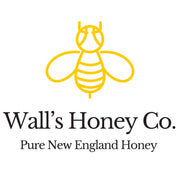We love it when our community asks us questions about beekeeping, our bees and our honey. One question we get asked regularly is “is your honey raw?” or “what is raw honey”? Raw honey is defined as “honey as it exists in the beehive or as obtained by extraction, settling or straining without adding heat.” By using this definition, raw honey is honey that has not been heated above ambient temperature.
Honey may sometimes require a gentle, low temperature warming which is less than 35 degrees Celsius in order for it to be runny enough to extract and bottle. This honey then passes through a coarse (wide) filter which catches any large debris in the honey (so you don’t get ‘floaties’ in your jar. Honey that goes through this process retains all of its micronutrients and pollen – essentially retaining all of the ‘good bits’. This is the process Wall’s Honey goes through and classifies the honey as ‘raw’.
Conversely, regular honey often undergoes intense processing, including pasteurisation and pressure filtration through a very fine filter. Honey pasteurisation occurs at temperatures above 40 degrees and destroys the good bacteria and the ultrafiltration removes much of the pollen and micronutrients. Honey producers often choose this method as it significantly slows honey crystallisation. This is why honey crystallisation is a sign of raw, pure honey and definitely not a bad thing!
Bee pollen is collected along with nectar by honey bees. While we often focus on honey, bee pollen has been shown to be highly nutritious, containing over 250 substances, including vitamins, amino acids, essential fatty acids, micronutrients and antioxidants. Unfortunately, pasteurisation removes many of these ‘good bits’ and leaves the consumer with essentially a sugar syrup.
In summary, raw honey like Wall’s Honey Co honey, retains many of the micronutrients and pollens straight from the beehive. We recommend seeking out honey from your local beekeeper so you know its provenance – where it has been and how it got to you has never been more important.

